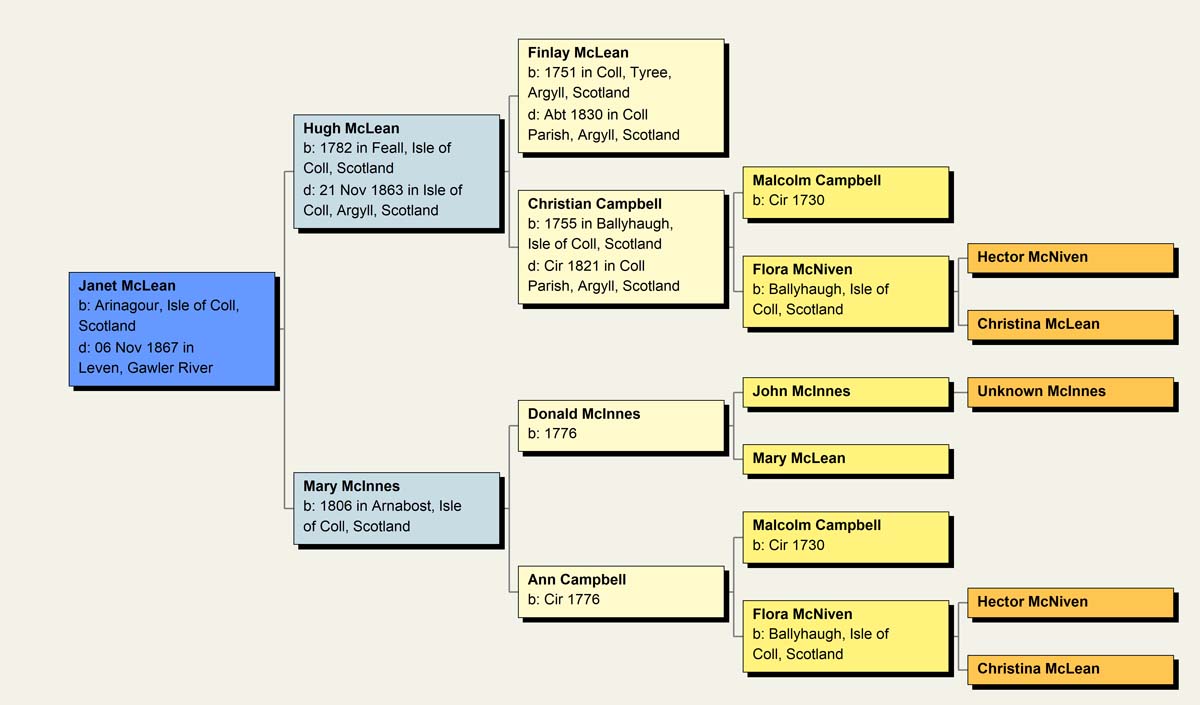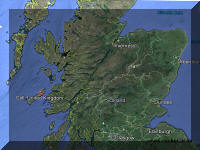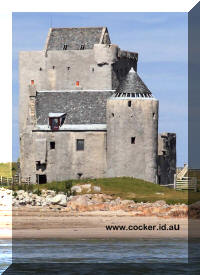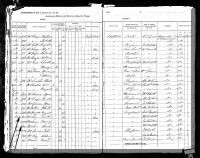Family of Janet McLean
Janet was born to Hugh Mclean and his wife Mary McInnes in 1830 at Arinagour, the port and main town of the lsle of Coll, Scotland. She was christened at Arinagour on 14 Jan 1830.
She emigrated from Scotland, arriving in Launceston on the Broomielaw on 31 Mar 1857 and married John McHugh on 16 Oct 1857 in Launceston. John was born about 1831 in North West Ireland, died on 8 Apr 1892 in Launceston aged about 61, and was buried on 10 Apr 1892 in the Charles Street Cemetery, now Ockerby Gardens, Launceston, Tasmania. They had five children: John, Hugh, James, Edward and Janet. Janet died on 6 Nov 1867 in Leven, Gawler River, Tasmania at age 37, and was buried in the Methodist Cemetery at North Motton.

Janet was the granddaughter of Finlay McLean and Christian Campbell and Donald McInnes and Ann Campbell all from the Isle of Coll, Argyll, Scotland. Chrsitian and Ann were sisters, both being daughters of Malcom Campbell and Flora McNiven.
Coll is an island located west of Mull in the Inner Hebrides of Scotland. It is in the council area of Argyll and Bute. Coll is about 21 km long by 3 miles 5 km) wide. Coll's sandy beaches rise to form large sand dunes. It was home to a branch of the Clan Maclean for 500 years. In 1590 the McLeans of Duart invaded their cousins on Coll with the intention of taking the island for themselves. A battle was fought at Breachacha Castle where the Coll clan overwhelmed the Duarts, chopped off their heads and threw them in the stream, which is still known as "the stream of the heads". The McLeans of Coll retained their baronial fief and castle until 1848 when Alexander Maclean of Coll emigrated to Natal, South Africa where he died unmarried. Breachacha Castle on the south coast dates from the 15th century and has been restored.
Coll, Breachacha Castle and Arinagour
The population of Coll is now around 200 but was much higher in the past. In the late 18th century there were about 1,000 people supported by agriculture and fishing but during the Highland clearances of the 1830s and 1840s, half the population left, many of them moving to Australia, Canada or South Africa.
Janet’s family would have led a subsistence lifestyle living in little more than a hovel, known today as an island blockhouse. An excellent description of the life and the changing circumstances which led to the large scale repatriation of residents may be found here.
At some stage Janet and her cousin Sarah moved to Glasgow. They were unable to read and write and probably only spoke Gaelic. They were recruited by St Andrew’s Immigration Society which was formed to recruit labourers to Van Diemen’s Land that were not convicts and that were of a ‘superior type’.
The Society advertised in Glasgow in December 1856 as follows;
FREE EMIGRATION IS AGAIN RESUMED TO VAN DIEMAN'S LAND, (NOW CALLED TASMANIA),
FOR SCOTTISH EMIGRANTS ONLY.
Under the ST. ANDREW'S EMIGRATION SOCIETY, and the Government Bounty System
The Society has specially for its object the introduction of useful Emigrants, not indiscriminately taken up without regard to their qualifications, but well selected, and adapted to the wants of the Colonists.
For the protection and advantageous settlement of Female Emigrants not under the charge of relatives, the Colonial Government have made the most careful provision, no person being permitted to hire any Female from the 'Depot' without the authority of the Government Immigration Officer and the Secretary of the Society, by whom the capabilities and wishes of each woman, with regard to employment, are ascertained;
and that those persons only who are known to be suitable employers are allowed to hire any servant from the 'Depot.' By this means no young woman can fall into improper hands on her arrival in the Colony.
The Passages are given Free, under conditions that the Emigrants agree to pay to the Society, Six Months after arriving in the Colony, £8 for 0 Family, and £5 for a Single Individual, and to reside in the Colony four years, or pay his, proportion of Passage-Money should he remain less than that time.
The following description of Emigrants can be taken:
Experienced Ploughmen and Shepherds, Housemaids, Cooks, and Tablemaids, and Families accustomed to Agricultural Employment. Those without encumbrance will be preferred.
Full information will be obtained on personal application being made to
Messrs. McNAUGHTAN & COCHRANE 163, Ingram Street, Glasgow; or to Mr. ALEXANDER BLAIR, The Selecting Agent
Janet and her first cousin Sarah arrived in Launceston from Glasgow on 31 Mar 1857 on the emigrant ship Broomielaw along with 200 other immigrants for the St Andrew’s Society, including John Stewart. He was from Scotland, aged 26, Presbyterian and could read and write. His trade was ploughman and he was introduced by William Gunn. Janet and Sarah Mclean had consecutive Single Bounty Ticket numbers (602 and 603) and identical details, including the sponsor. This shows that they enrolled and boarded in Glasgow together.
The Launceston Examiner reported the arrival of the Broomielaw and the appreciation of the passengers on Thursday 2 Apr 1857.
The Broomielaw entered the Tamar heads on Tuesday last, having come to an anchor outside on the previous day. She left the Clyde in tow on 20th December, and was cleared at the Tail of the Bank on the 23rd, by the Immigration Officer, and was towed to sea on same day. The following testimonial has been presented to Capt. Blyth, of the clipper-ship Broomielaw :
Sir,--Our voyage being now come to a termination, we cannot think of bidding you farewell without in some way expressing the gratitude we feel towards you. We had a wish to have given you some more substantial and lasting evidence of our esteem; but being entirely under the control of others, we are uncertain whether we will have an opportunity, after we land, of fulfilling our desires in this matter. We therefore fall back on that which is within our power, vis., --the compiling our sentiments into an address, of which we beg your acceptance.
We, Sir, believe that the inconvenience attending a long sea voyage has been in a great measure ameliorated by the constant kindness you have shown towards us. We have seen you in several of the most trying circumstances that a man in your position can be placed in ;--when your ship was a partial wreck. The indefatigable energy displayed by you in getting her repaired again and again tended greatly to rouse our drooping spirits, and inspire confidence that you would make, not only safe but an expeditious passage, though circumstances seemed leagued against you. Combined with great energy and perseverance, you possess an unassuming kindliness of manner, which is the true characteristic of the British sailor.
Believe us, however anxious we may be to get our feet on terra firma, it will not be without feelings of regret that we shall bid you farewell; and in after years, when recalling the scenes we have witnessed on board the Broomielaw, you will always be remembered with feelings of respect and gratitude. We also beg leave to express our appreciation of all the arrangements made by you to promote our comfort during the whole voyage. That comfort has been augmented by the courtesy and kindness of all your officers and crew, to whom we also tender our sincere thanks. And now, Sir, while saying farewell, we beg leave to wish you every happiness, both in your public and private capacity ; and we pray you may be long spared to discharge the onerous duties of the profession you adorn.
Be pleased, Sir, to accept the above small tribute of our esteem.
Signed by the Passengers Ship Broomielaw
Janet would have been taken by her sponsor, Thomas Corbett, to her new place of employment, Dalness, the farming property at Evandale owned by Allan McKinnon, and his wife Jessie Mclean. Allan McKinnon arrived in Tasmania in 1823, became owner of Strath in 1827 and of Dalness in 1835, He was a justice of the peace for upwards of 20 years and died at Dalness in 1877.
For Janet, even a life of service at Dalness would have been comparative luxury. But she was to marry potter John McHugh just eighteen months later. Cousin Sarah was witness to their wedding in Launceston on 16 Oct 1857. John and Janet had five children before she died just ten years after marrying John and eighteen months after the birth of their fifth child and only daughter. A Burnie Advocate article on the history of North Motton on 21 Jan 1922 reported that the first death in the district was that of the wife of Mr. McHugh and it was attributed to lack of medical aid. She may well have been with child again.





